Key takeaways
- Bidding on government contracts offers long-term, stable, and highly lucrative opportunities for construction companies.
- Businesses that win government contracts will enhance their reputation and pave the way for future opportunities.
- Bidding on government construction projects can be highly competitive, requiring detailed and compelling RFQs.
- Small businesses can utilize software tools to craft accurate, comprehensive RFQs to compete more efficiently for government contracts.
The construction industry is the backbone of modern society and one of the most valuable markets in the world. People need homes, companies need office buildings, retailers need storefronts—the list goes on. Construction projects vary wildly, but one subsector stands out as particularly lucrative: government contracts. This is why every contractor should know about bidding on government contracts. After all, a successful bid could result in significant growth for your company.
Landing a government contract might not fund a business for its lifespan, but it certainly pays well, and more importantly, it can open other doors. In this article, we’ll go over what a government contract entails, what bidding on government contracts looks like, and how to bid on government contracts.
What is a government construction contract?
Even if you don’t give it much thought, you probably understand that the government does a lot of things and, therefore, employs a lot of people. In fact, at the end of 2022, the US federal government employed 2.87 million workers, which was 1.9% of the US workers at the time. While the government isn’t a typical business, it still requires many things that a typical business does, such as office buildings, computers, networks, servers, and so on.
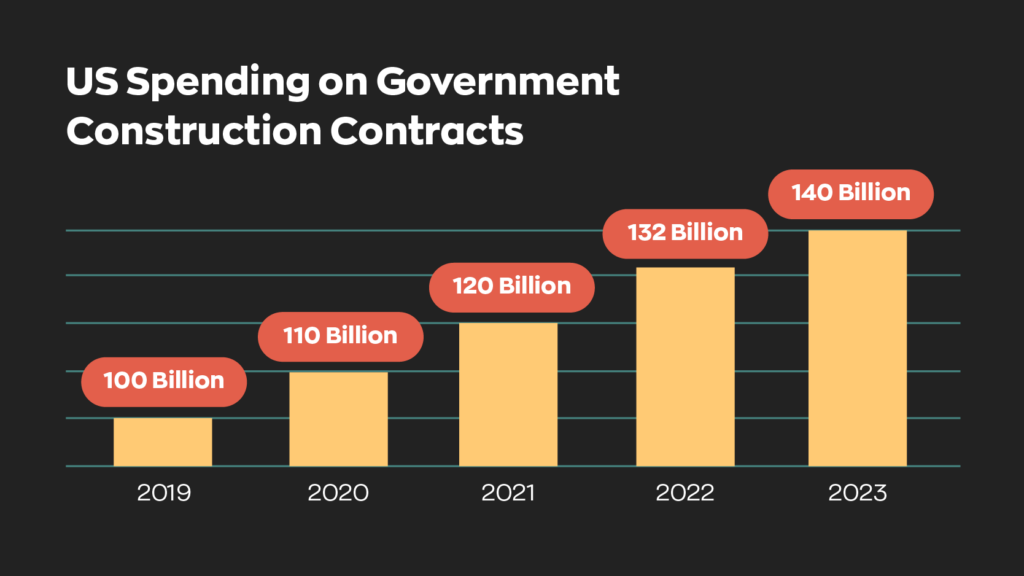
Generally speaking, the government doesn’t retain employees capable of setting all these things up. Instead, they outsource it via contracts. From here, different companies can start bidding on government contracts.
Something worth noting here is that there are many different types of government contracts. As we mentioned earlier, the government is responsible for many things. For example, the military needs equipment to function, but the government doesn’t manufacture it. Instead, it outsources that work to private companies through government contracts.
The military is the most obvious example, but there are government contracts for a number of different services, from transportation and waste disposal to more complex tasks—like designing and building rockets for NASA.
Government contracts for construction are no different. They need something built, so they allow various companies to bid on government contracts in order to find the best fit.
Why should contractors bid on government contracts?
There are many reasons to bid on government contracts. First and foremost, they tend to be lucrative. The government has deep pockets and generally worries more about receiving the best product or service available than price. Government contracts also tend to be long-term. Instead of taking place over one or two years, government contracts generally span over five or ten.
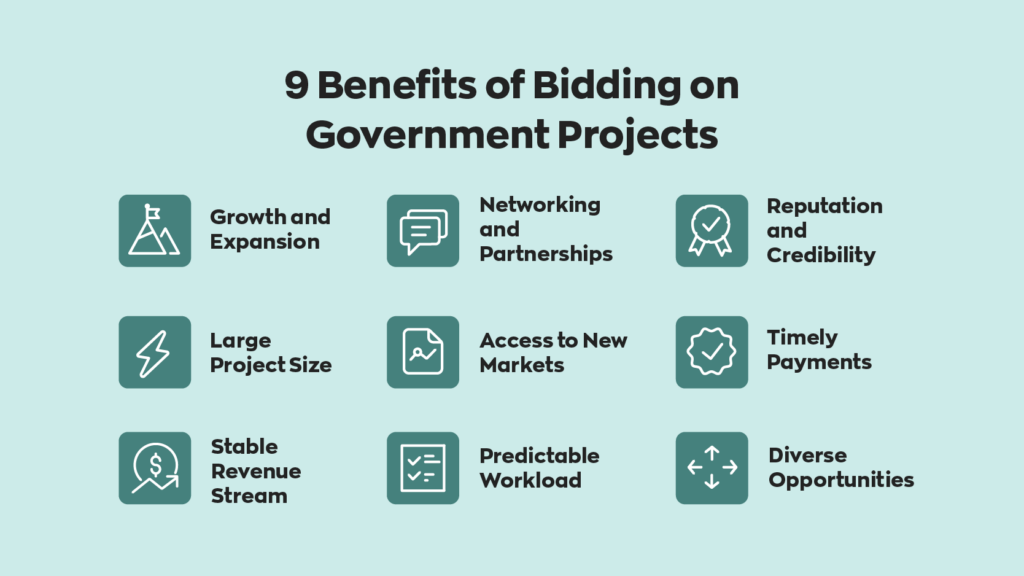
This offers a lot of stability in an industry infamous for quickly changing conditions. For example, in 2022, NASA awarded SpaceX a $843 million contract for the Artemis 4 mission, which isn’t until 2028.
Contractors who win a bid on government contracts will benefit more than just financially. A government contract is a notch on the belt for any field service company. It tells other potential clients that the government chose your company for the job out of all the other applicants. That counts for a lot.
In short, winning a government contract has many less tangible benefits aside from money.
Where do contractors find government construction contracts?
So, now the big question is how to bid on government contracts as a small business. There are a few different ways. Occasionally, a government may reach out to a specific business or company, but this is uncommon, especially for smaller businesses.
Most of the time, federal governments will have a website or portal to list contract opportunities. The USA, for example, has sam.gov, which lists federal contracts for registered businesses (note: registration is free). Canada, on the other hand, has Canada Buys. Regardless of where a construction business operates, there are opportunities available. So check to see how your local government advertises their contracts. These websites are where all construction companies go when they are looking to bid on government contracts, whether your company has two people or two hundred.
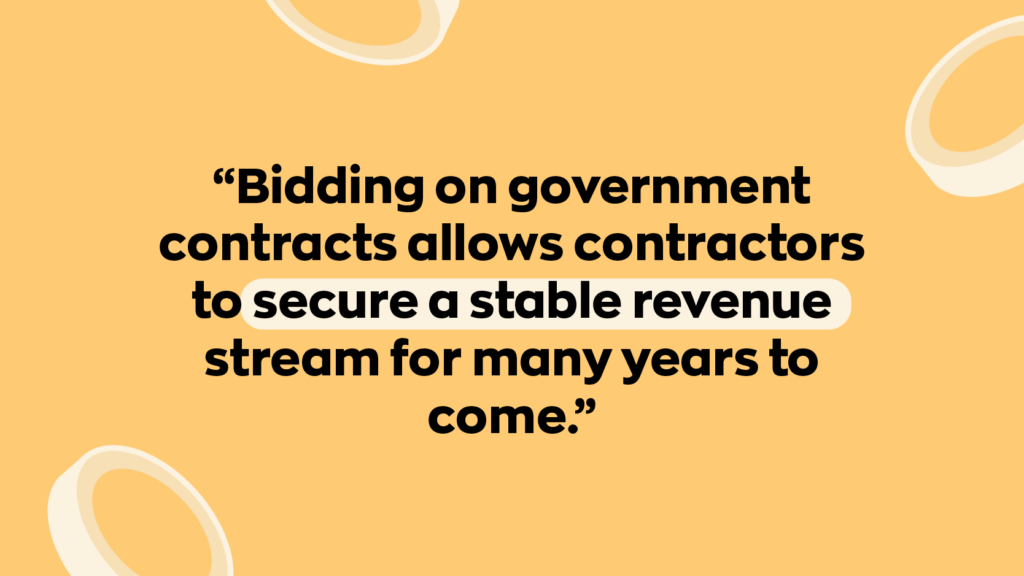
However, more prominent companies will often have an edge when bidding on government contracts with an enormous scope of work. This is why organizations like the US Small Business Administration (SBA) exist. They help small businesses by offering contracts that match their skill sets. That said, they have a formula for deciding whether a business is “small.” So, ensure your business meets those criteria before applying or bidding on government contracts.
How does the bidding process work?
Once you’re ready to bid on government contracts, you must register with the relevant government website or portal. This process is pretty straightforward and shouldn’t take too long. From there, you’ll move on to the next phase, the request for proposal ( RFQ). The government in question will outline the project requirements and invite contractors to submit proposals. At this phase, you get a chance to sell yourself, stating estimated costs, timelines, qualifications, and so on.
The request for proposal phase is an audition, and this is where the competition starts. A ton of different companies will be bidding on government contracts and sending in their proposals. Standing out among the crowd requires being able to give better numbers, whether that’s a quicker schedule or lower costs. Organizing information in a cohesive way and including visuals can also provide an edge over the competition.
At the end of the day, though, making solid proposals requires intimate market knowledge and experience. These are what craft your proposal and ultimately decide who wins the contract. Do your research beforehand and take the time to craft an RFQ that will stand out from your competition.
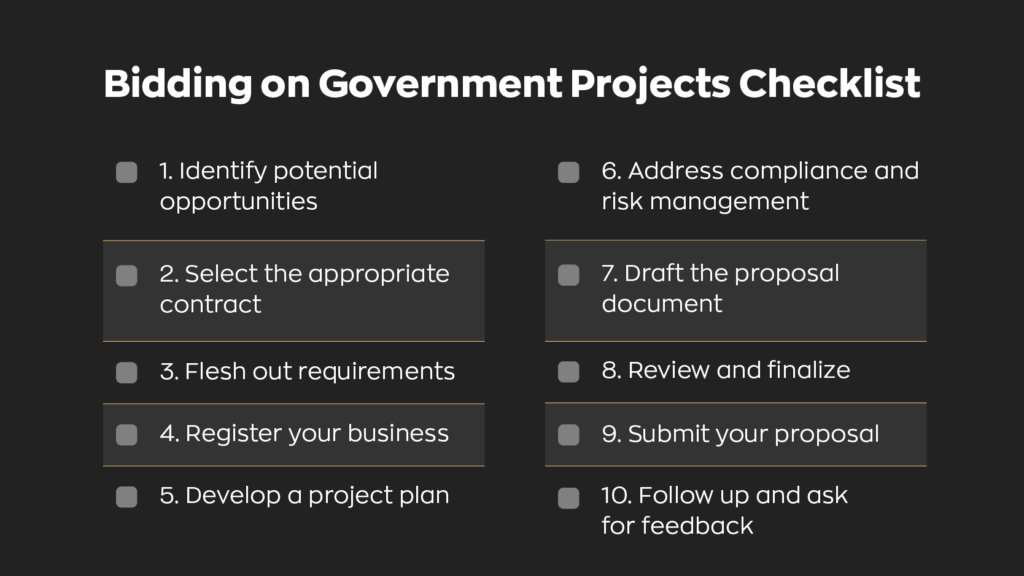
How to successfully bid on government contracts as a small business
Most businesses start small, but that’s no reason to forgo bidding on government contracts. To be clear, though, you won’t be competing with just other small businesses. You’ll also be competing with huge conglomerates that have storied tales behind them.
To stand out, it’s all about effectively selling yourself. To do this, you must create a comprehensive and competitive RFQ. Here are three major things to consider:
- Understand the scope—Ensure you understand what you’re getting yourself into when bidding on government contracts. Be honest about timelines and material costs because overpromising never ends well, especially when dealing with the government.
- Cost Analysis—presenting an accurate cost analysis is one of the most essential aspects of any RFQ. If you use field service software, such as inFlow, this shouldn’t be too hard. Our software provides users with various reporting features that make job cost analysis fast and easy.
- Compliance—The construction industry takes compliance very seriously, and so should you. Your RFQ should show without a shadow of a doubt that your company will meet all regulations and compliances.
A great RFQ is also more than just numbers on a page. You should also emphasize your company’s strengths and past achievements. You could even think about going the extra mile and including visuals to help illustrate your vision for the government contract.
Final thoughts
Making a successful bid on government contracts is no easy task, but the payoff is enormous. If you spend the time to find and bid on these contracts, you could set up your construction company for years to come.
Bidding on government contracts doesn’t have to be daunting, either. It’s all about having the right tools to make the process easier and less time-consuming. With the right software solutions, you’ll win those contracts in no time.



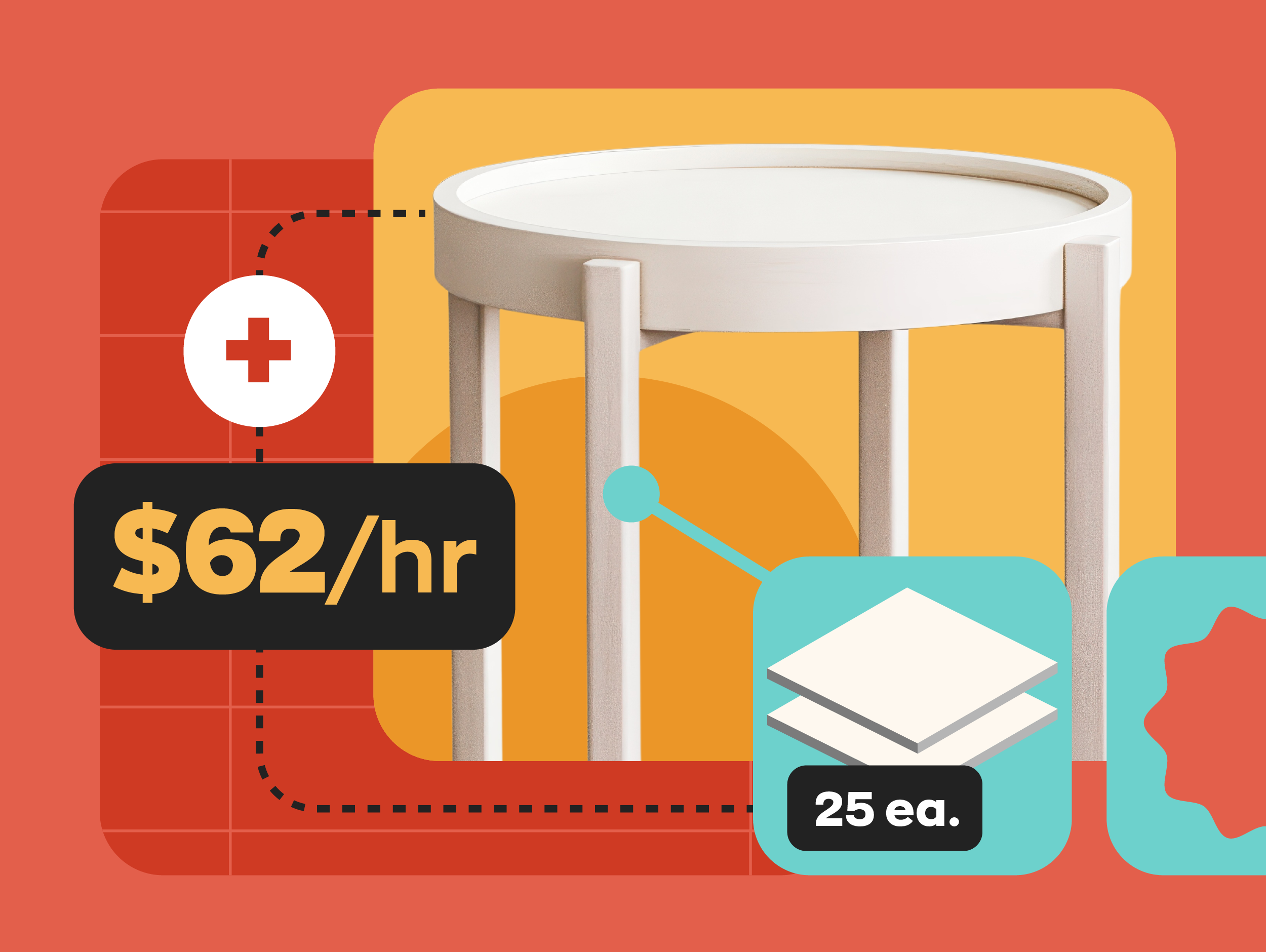

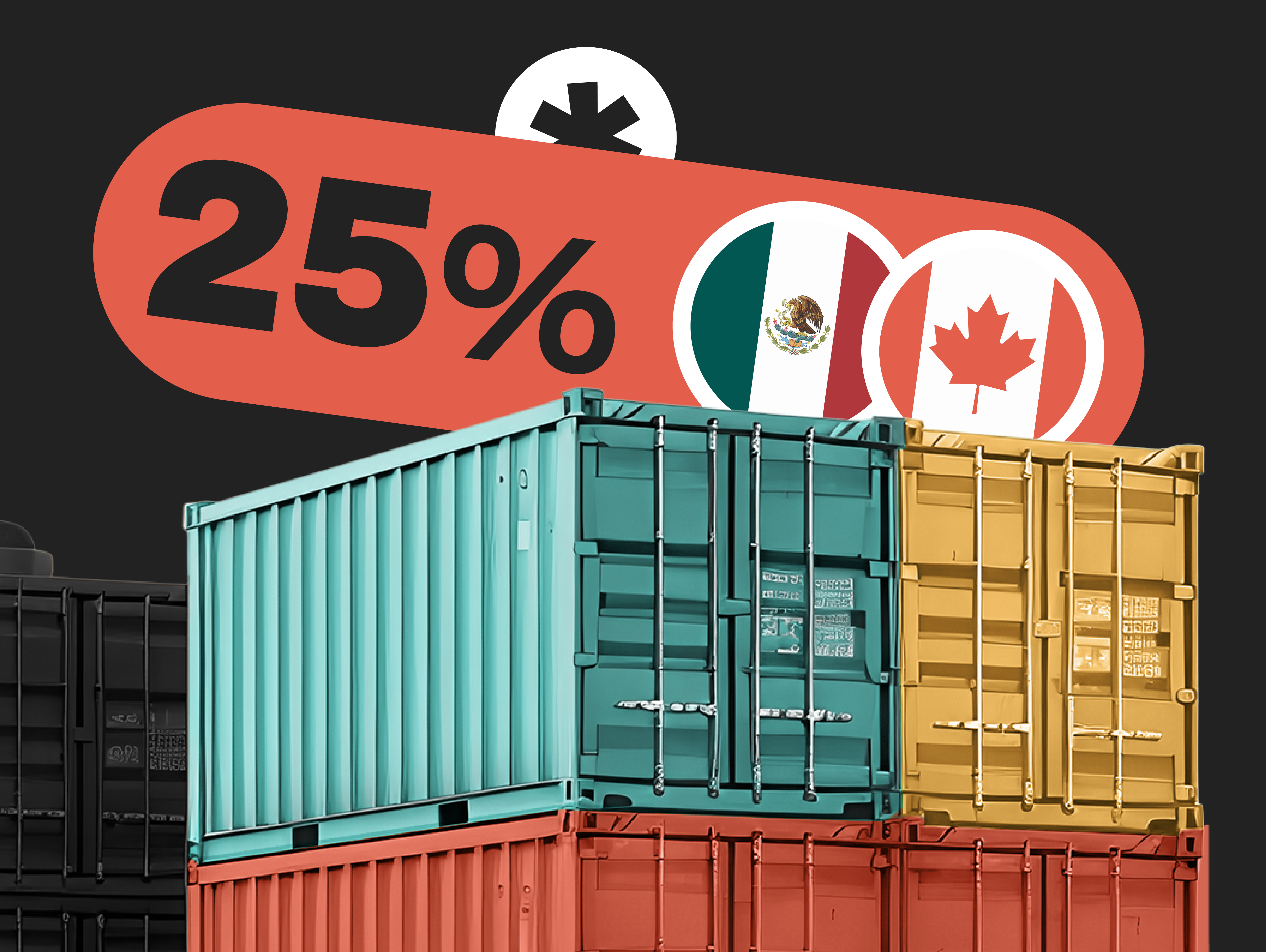
0 Comments